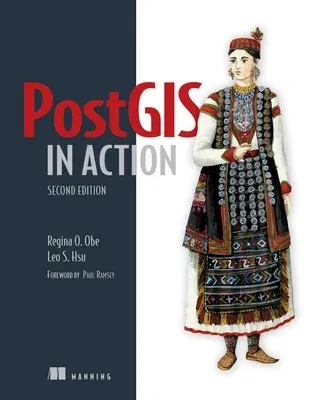Summary
PostGIS in Action, Second Edition teaches readers of all levels to
write spatial queries that solve real-world problems. It first gives you
a background in vector-, raster-, and topology-based GIS and then
quickly moves into analyzing, viewing, and mapping data. This second
edition covers PostGIS 2.0 and 2.1 series, PostgreSQL 9.1, 9.2, and 9.3
features, and shows you how to integrate with other GIS tools.
Foreword by Paul Ramsey.
Purchase of the print book includes a free eBook in PDF, Kindle, and
ePub formats from Manning Publications.
About the Book
Processing data tied to location and topology requires specialized
know-how. PostGIS is a free spatial database extender for PostgreSQL,
every bit as good as proprietary software. With it, you can easily
create location-aware queries in just a few lines of SQL code and build
the back end for a mapping, raster analysis, or routing application with
minimal effort.
PostGIS in Action, Second Edition teaches you to solve real-world
geodata problems. It first gives you a background in vector-, raster-,
and topology-based GIS and then quickly moves into analyzing, viewing,
and mapping data. You'll learn how to optimize queries for maximum
speed, simplify geometries for greater efficiency, and create custom
functions for your own applications. You'll also learn how to apply your
existing GIS knowledge to PostGIS and integrate with other GIS tools.
Familiarity with relational database and GIS concepts is helpful but not
required.
What's Inside
- An introduction to spatial databases
- Geometry, geography, raster, and topology spatial types, functions,
and queries
- Applying PostGIS to real-world problems
- Extending PostGIS to web and desktop applications
- Updated for PostGIS 2.x and PostgreSQL 9.x
About the Authors
Regina Obe and Leo Hsu are database consultants and authors.
Regina is a member of the PostGIS core development team and the Project
Steering Committee.
Table of Contents
- What is a spatial database?
- Spatial data types
- Spatial reference system considerations
- Working with real data
- Using PostGIS on the desktop
- Geometry and geography functions
- Raster functions
- PostGIS TIGER geocoder
- Geometry relationships
- Proximity analysis
- Geometry and geography processing
- Raster processing
- Building and using topologies
- Organizing spatial data
- Query performance tuning
- Extending PostGIS with pgRouting and procedural languages
- Using PostGIS in web applications
PART 1 INTRODUCTION TO POSTGIS PART 2 PUTTING POSTGIS TO WORK PART 3
USING POSTGIS WITH OTHER TOOLS

